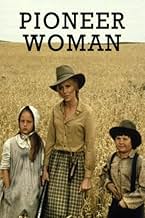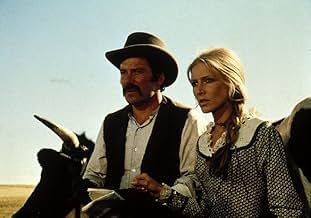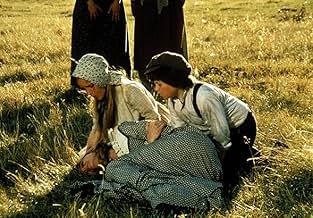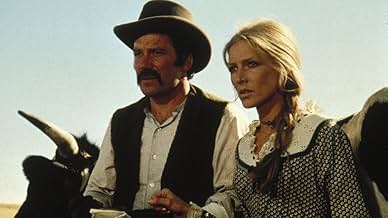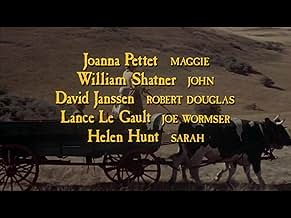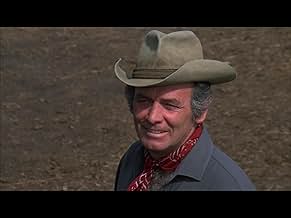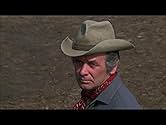Despite some initial hesitations, a family from the East decides to try their luck by settling in the harsh and dangerous West in 1867.Despite some initial hesitations, a family from the East decides to try their luck by settling in the harsh and dangerous West in 1867.Despite some initial hesitations, a family from the East decides to try their luck by settling in the harsh and dangerous West in 1867.
- Awards
- 1 win total
Lance LeGault
- Joe Wormser
- (as Lance Le Gault)
John Scott Martin
- Jake
- (as John Scott)
Una Pulson
- Mrs. Hall
- (as Una Poulson)
- Director
- Writer
- All cast & crew
- Production, box office & more at IMDbPro
Featured reviews
A woman is forced to leave her comfy Indiana city to go to Nebraska with her family because her husband wants to farm. She faces finding out they were scammed and there is no land, a miscarriage, widowhood after they finally find a place to settle, and holding on to the place with her children. The one false note is her playing hard-to-get with an obviously smitten neighbor who is ringing her chimes as well.
Joanna Pettet is the woman, William Shatner her husband and David Janssen the man who wants to be. If you can believe this bit of casting, Lance LeGault is a friendly neighbor and totally good guy. Helen Hunt makes her acting debut as the woman's daughter. Yes it's a feminist piece since a "pioneer feminist" is who the story revolves around, but it's not preachy and is well done.
Joanna Pettet is the woman, William Shatner her husband and David Janssen the man who wants to be. If you can believe this bit of casting, Lance LeGault is a friendly neighbor and totally good guy. Helen Hunt makes her acting debut as the woman's daughter. Yes it's a feminist piece since a "pioneer feminist" is who the story revolves around, but it's not preachy and is well done.
I've always thought of Joanna Pettet as one of the most beautiful and glamorous women of the big screen and small in the latter half of the last century. So it's a pleasant surprise that in Pioneer Woman Pettet ditches the glamor and becomes a hard working Pioneer Woman who salvages her husband's dream of going west.
She faces some real problems as she and husband William Shatner sell all they have in Indiana move west on land Shatner bought from the railroad. Shatner does this unilaterally without consulting Pettet, in those days that is how it was done.
First Shatner gets uprooted from his land by some brothers who've been working it for seven years now. Then he's killed homesteading new land in Wyoming territory.
Pettet makes some critical choices for herself and kids Helen Hunt and Russell Baer. Hard work, a little luck and an understanding an hunky neighbor in rancher David Janssen make her believe that staying might be the best idea.
Pioneer Woman is a sober assessment of what pioneer life was like on the American frontier. Even without Indian wars it was still a rugged existence especially for a woman.
Pettet shows she has the right stuff. In fact this G rated film is actually quite the feminist manifesto.
A great film for family and feminist audiences if you can believe that.
She faces some real problems as she and husband William Shatner sell all they have in Indiana move west on land Shatner bought from the railroad. Shatner does this unilaterally without consulting Pettet, in those days that is how it was done.
First Shatner gets uprooted from his land by some brothers who've been working it for seven years now. Then he's killed homesteading new land in Wyoming territory.
Pettet makes some critical choices for herself and kids Helen Hunt and Russell Baer. Hard work, a little luck and an understanding an hunky neighbor in rancher David Janssen make her believe that staying might be the best idea.
Pioneer Woman is a sober assessment of what pioneer life was like on the American frontier. Even without Indian wars it was still a rugged existence especially for a woman.
Pettet shows she has the right stuff. In fact this G rated film is actually quite the feminist manifesto.
A great film for family and feminist audiences if you can believe that.
For long years, the idea of the "TV movie" has portended a level of artifice unbecoming of actors, and ill-suited for the big screen. I'm not going to say that 'Pioneer woman' is perfect, because it's not; there's undeniable ham-handedness about the production in no small part, especially nearer the beginning. To my pleasure, however, it's more enjoyable than not, with writing and direction just suitable enough to give the cast a slight opportunity to demonstrate their skills - while earning a nice little paycheck. Though certainly marked by a measure of kitsch, William Shatner gives an admirable performance as prideful John Sergeant, commendably restrained and emotive compared to his most bombastic displays. It's quite worth noting that Helen Hunt makes her debut as young Sarah, only 10 years old when the feature premiered. And I appreciate Joanna Pettet's turn as protagonist Maggie, a role that allows her so show even in this context her range, nuance, and potential as a leading lady.
It's a pretty straightforward narrative here - dialogue and characters are adequate as they are written; scene writing is strong enough to help complete the story, give the actors room to work, and keep us invested. More than anything 'Pioneer woman' represents a portrait of the hardship of western expansion and the settler life - disputes, unpredictable conditions and turns, scarcity, endless hard work. It's a fairly solid period piece, replete with great care for costume design, set design and decoration, props, and depictions of the wide, open spaces that are all to easy to overlook in our modern busy lives. All the while, there are also consistent themes including pride, the meaning of home, men's selfishness (a notion that, let's face it, requires little actual acting from Shatner), the importance of community - and, one must note, touches of casual racism, and sexism as reflected in predominant patriarchy.
Suzanne Clauser's screenplay surprises for how good it is, and Buzz Kulik's direction, and the production design broadly. This picture is hardly a revelation, but honestly, it's much better than it has any right to be. I began watching with mixed expectations at best, and find that I am pleasantly satisfied with the result. I don't think there's any reason to go out of your way to watch this, but 'Pioneer woman' is an enjoyable, engaging movie if you come across it - and to my delight, not at all a bad way to spend 75 minutes.
It's a pretty straightforward narrative here - dialogue and characters are adequate as they are written; scene writing is strong enough to help complete the story, give the actors room to work, and keep us invested. More than anything 'Pioneer woman' represents a portrait of the hardship of western expansion and the settler life - disputes, unpredictable conditions and turns, scarcity, endless hard work. It's a fairly solid period piece, replete with great care for costume design, set design and decoration, props, and depictions of the wide, open spaces that are all to easy to overlook in our modern busy lives. All the while, there are also consistent themes including pride, the meaning of home, men's selfishness (a notion that, let's face it, requires little actual acting from Shatner), the importance of community - and, one must note, touches of casual racism, and sexism as reflected in predominant patriarchy.
Suzanne Clauser's screenplay surprises for how good it is, and Buzz Kulik's direction, and the production design broadly. This picture is hardly a revelation, but honestly, it's much better than it has any right to be. I began watching with mixed expectations at best, and find that I am pleasantly satisfied with the result. I don't think there's any reason to go out of your way to watch this, but 'Pioneer woman' is an enjoyable, engaging movie if you come across it - and to my delight, not at all a bad way to spend 75 minutes.
It's pretty clear that "Pioneer Woman" was actually a pilot for a proposed series. Probably it was for the best it wasn't picked up, because there aren't any signs that this would have been especially engaging or surprising. It does get some historical details more exact than a lot of other westerns - for example, it's correct in showing that covered wagons used oxen for the most part and not horses, and that settlers often built houses with sod instead of logs. As well, the first half of the movie gives plenty of entertainment thanks to William Shatner, because he gives one of his hammier performances.
This film was much better than I originally expected. Set in the post-Civil War era, it depicts the plight of a small family in Indiana setting out west to start a farm. "John Sergeant" (played by William Shatner) gambles everything on some land in Nebraska in the hope for a brand-new life. His wife, "Maggie Sergeant" (Joanna Pettet) is reluctant to leave but does the best she can to support her husband. Along the way out west, they encounter hardship and disappointment which this film displays in a very realistic manner. And while William Shatner gives a decent performance, it is Joanna Pettet who is the real star of this picture as her acting was first-rate. David Janssen (as "Robert Douglas") is also quite good playing the part of a free-range cowboy in a supporting role. The weaknesses in this movie are few, but if I had to list one it would probably be that the ending could have been drawn out a bit more. All things considered though, there are plenty of westerns which have a great deal more violence and action than this particular film. But if you're looking for a movie that is fresh and genuine then this is a fine candidate, especially for family viewing.
Did you know
- TriviaTelevision debut of Helen Hunt.
- Quotes
Robert Douglas: It's a pretty tough life for a woman without a man.
Maggie Sergeant: It's a hard life, Mr. Douglas, with or without a man.
Details
Contribute to this page
Suggest an edit or add missing content


